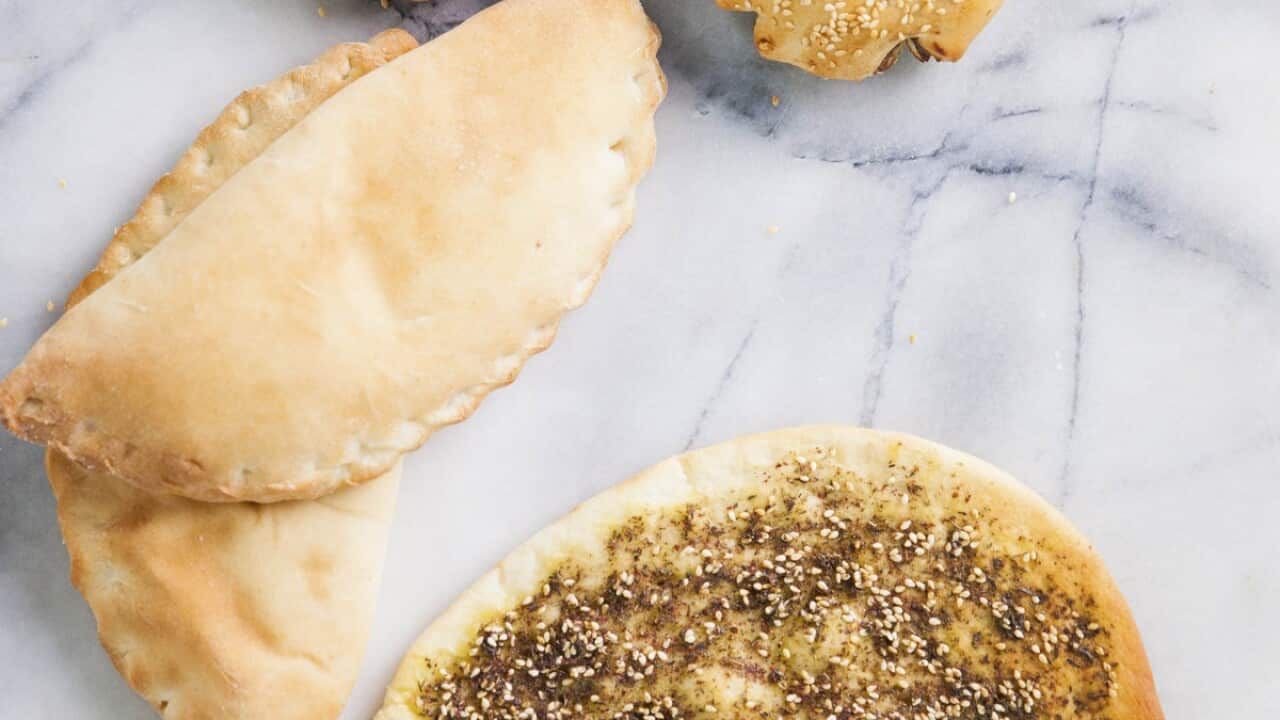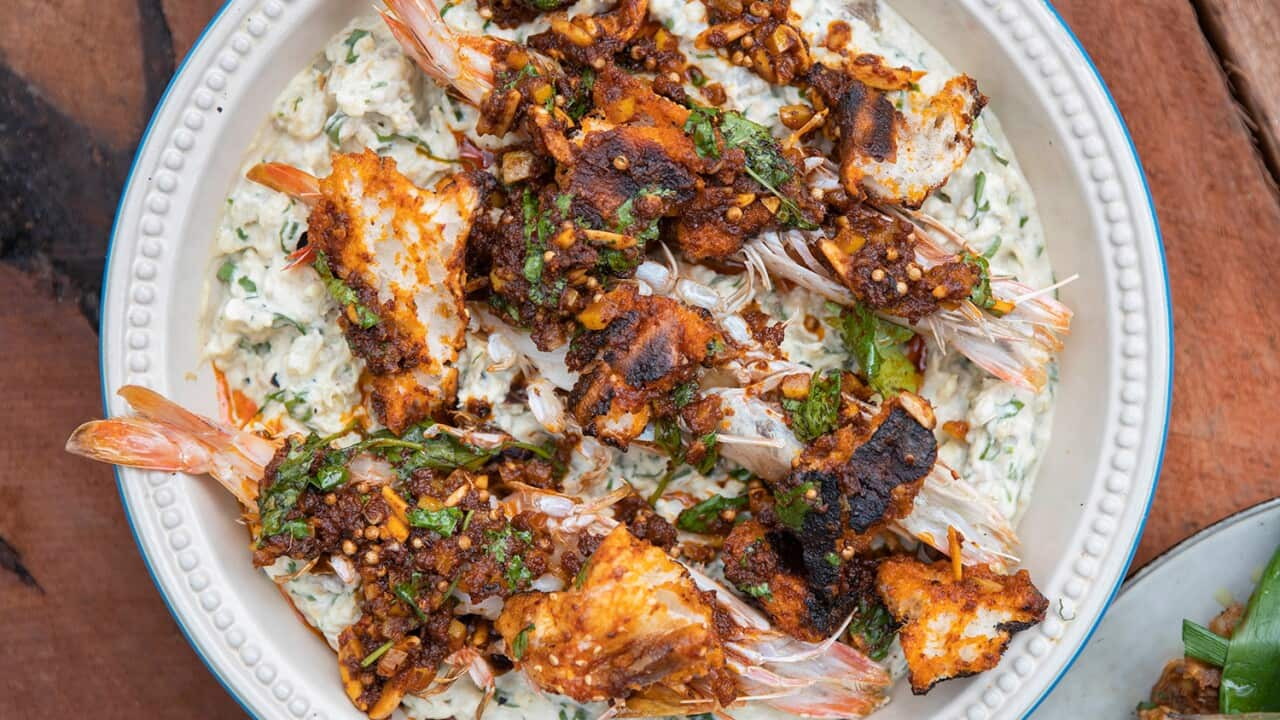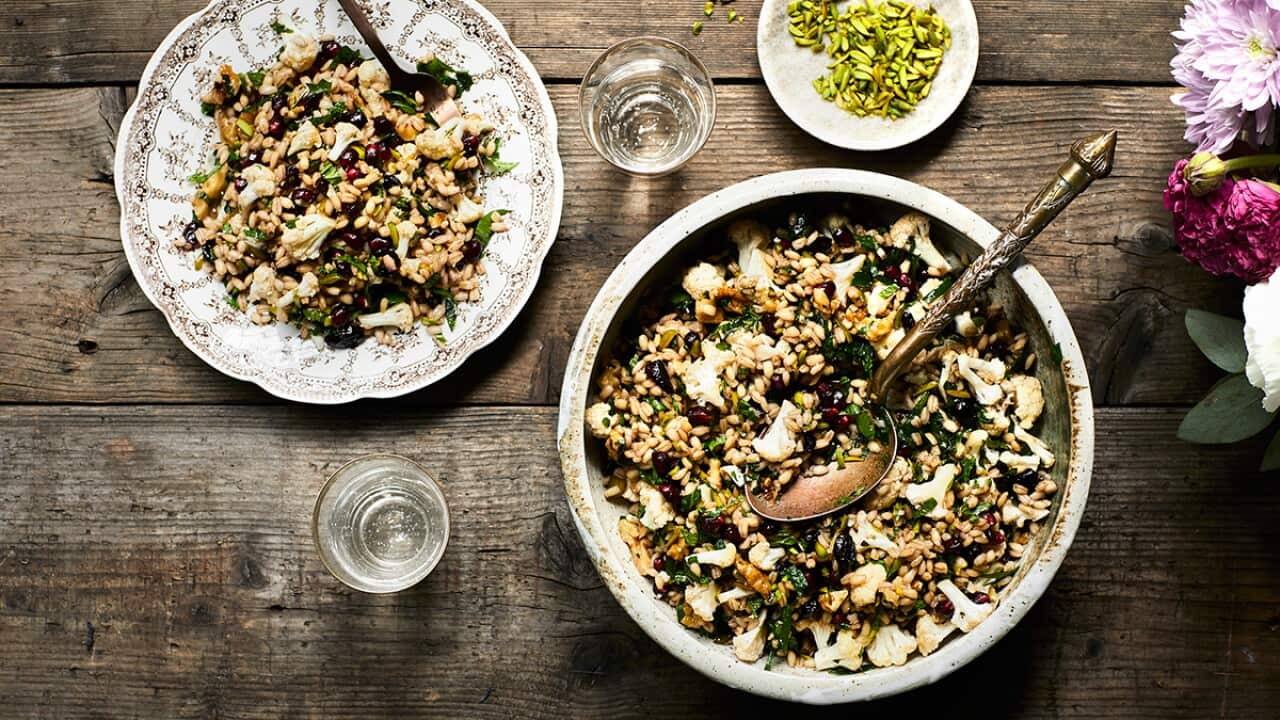--- Watch Shane Delia and friends showcase their favourite dishes from the Middle East in streaming free on SBS On Demand. ---
The family meal has long been a sacred tradition around the world. One man who can attest to this is , the Middle Eastern chef-owner of restaurant in Collingwood, Melbourne. Nearly everything he knows about his heritage and the cuisine of Israel, where he grew up, came from conversations at the dinner table.
Born in Rehovot, a city just south of Tel Aviv in Israel, to a Tunisian mother and Moroccan father, Ittah grew up eating a variety of cuisines. Friday dinners with his family were a non-negotiable and an opportunity for his parents to pass on stories and traditions related to the food they were eating.
"Eating at home is something that was part of the culture, especially Friday dinner which was a Jewish tradition," Ittah says. Dinners typically consisted of rice, vegetables and a meat dish, including his mum's chicken tagine and his grandmother's couscous salad (both favourites). However, nothing beat the , which his mum would cook every Saturday morning.
Dinners typically consisted of rice, vegetables and a meat dish, including his mum's chicken tagine and his grandmother's couscous salad (both favourites). However, nothing beat the , which his mum would cook every Saturday morning.

For Moshe Ittah (bottom left as a child), family and food are intertwined. Source: Supplied
"It is a Jewish dish, but what they do is that they have a big pot, and fill it up with rice, beans, potatoes," Ittah explains. "You put it in the oven, and it's pretty much cooked the whole night on a very low heat until everything has broken down."
Whether it was a simple home-cooked meal, eating at a Tunisian wedding or celebrating Mimouna, the end of the Jewish Passover, with his grandmother's mufleta (also called mofletta), there was so much meaning behind every meal.
FOOD RITUALS

Mufleta
"I learnt all the flavours and the Jewish traditions of the Moroccan people and how they celebrate," Ittah says. "You get all that from the dinner table."
Food not only played a significant role in teaching Ittah about his heritage, but ended up shaping his career. As a child, Ittah spent hours scouring his mother's cookbooks and binge-watching celebrity chef Gordan Ramsay's food show Hell's Kitchen. He and his best friend would even sneak home during school lunch breaks and attempt their own MasterChef challenges using whatever was in the fridge.
"One particular day, my parents bought this amazing Scotch fillet steak," he recalls. "We cooked them and got so full that we didn't end up going back to school."
Eating at home is something that was part of the culture, especially Friday dinner which was a Jewish tradition.
Ittah's passion for cooking brought him to Australia in 2006, where he completed a culinary degree at William Angliss Institute. He worked his way across Melbourne's hospitality scene for the following 14 years, cooking at cafes and restaurants, such as and . However, he did so with the intention of opening his own restaurant that would pay homage to the flavours he grew up with.
"I'm a very goal orientated, and I said to myself, 'By the age of 25, I will open my own restaurant'."
This dream became a reality in 2018 when Ittah opened his first restaurant, . The menu takes inspiration from Middle Eastern, North African and Southern European cuisines, while embracing the diversity of Australia's food culture.
"A lot of things that I do are influenced by what I grew up on but with a kind of a different twist," Ittah explains. New Jaffa's Tunisian fricassee sandwich is now a household name, but it's also a dish his grandmother made for him as a child. The homemade lamb and beef kebabs are another signature item, inspired by a version Ittah's family cooked at Israel's annual Independence Day (Yom Ha'atzmaut) barbecues.
New Jaffa's Tunisian fricassee sandwich is now a household name, but it's also a dish his grandmother made for him as a child. The homemade lamb and beef kebabs are another signature item, inspired by a version Ittah's family cooked at Israel's annual Independence Day (Yom Ha'atzmaut) barbecues.

Some of Moshe Ittah's greatest cultural learnings happened around the dinner table. Source: Jordan Price
Today's New Jaffa is completely different to when it first opened. Their original street-food menu is still available at lunch, but Ittah has transformed the dinner menu to offer restaurant food.
"Most of the cooking that my mum used to do were things that took time," Ittah explains. "Lots of my new [dinner menu] is things that have a slow cooking process, rather than a quick cook… as she taught me that most of the best recipes are the recipes that take time."
In the future, Ittah hopes to bring more attention to the culinary traditions of his home country and incorporate more cuisines into his cooking.
"Israel is very similar to Australia when it comes to different cultures," he explains. "Jews from all over the world came to one area which is Israel, so you have Russian influence and Moroccan influence and Irani influence. It all comes together and creates this amazing mix of culture and food."
The menu may have changed but the two large communal tables that fill the restaurant's front room remain. Food got Ittah's family together and he hopes this communal dining experience will encourage more people to dine the proper Middle Eastern way.
"It's very important to stop at times, sit down, have a good meal with the important people that surround you," he concludes.
Betty's hamin (Jewish slow-cooked stew)
This is Moshe Ittah's mum's recipe for hamin, a traditional Jewish stew.
Serves 4
Ingredients
- 1 tbsp paprika
- 2 large onions
- 4 eggs, with the shell
- 500 g cannellini beans
- 4 medium potatoes, peeled
- 1 garlic head, cut in half
- 1 kg thigh cut of beef, can be chuck or even the cheek
- 4 pieces of beef bones with bone marrow inside (ask the local butcher to cut 3 cm-thick pieces)
- Water or beef stock
Method
- Heat 2 tbsp of olive oil in a medium pot on low heat, then add the paprika.
- Dice the onion and add to the pot. Cook for 1 minute.
- Add the beans in one area of the pot and the potatoes in another. Then, add the garlic and set the pot aside.
- In a pan with a bit of oil, lightly salt the beef and cook until golden brown in colour. When done, place it in the middle of the pot with the potatoes around it.
- Fill any spare spaces with the bone pieces.
- Fill the pot with just enough water to cover and bring to the boil.
- When boiled, skim the white bubbles from the surface and remove from heat.
- Place the 4 eggs on top.
- Cover and put the pot in a 100°C oven, usually overnight, for about 10-12 hours.
Photographs supplied by Moshe Ittah
A MIDDLE EAST FEAST

This three-ingredient Middle Eastern specialty is pure comfort food







